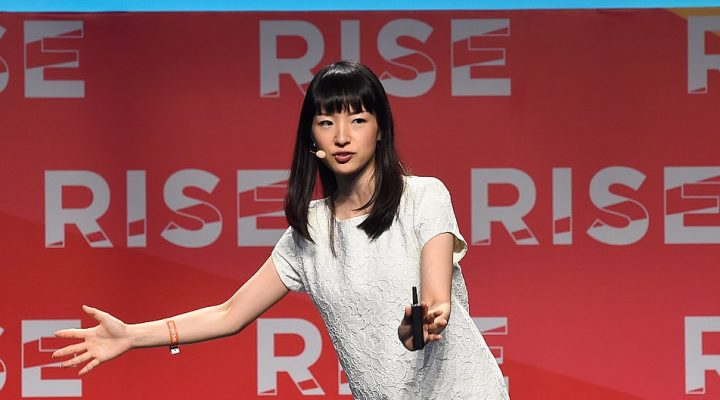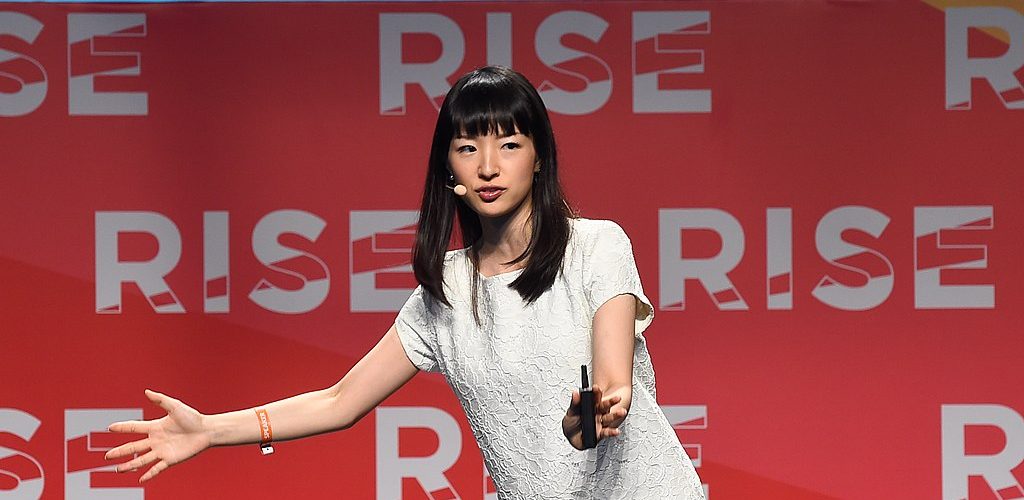Stop the presses: Marie Kondo, the “queen of clean,” confesses she can’t keep her own house perfectly pristine every single day.
The 38-year-old mogul of a global “tidying up” empire is now the mother of three — her third child was born in 2021 — and even she can’t clean up with all the chaos her terrible trio can create.
But guess what? It’s all good.
“I am busier than ever after having my third child, so I have grown to accept that I cannot tidy every day — and that is okay!” Kondo declares.
Say it ain’t so
Say it ain’t so, Marie. Even you, the renowned author of The Life-Changing Magic of Tidying Up and other mega-bestselling books about organizing our homes and lives, the all-knowing one with a beatific smile and an answer for every mess, are resigned to the inevitability of messiness in everyday life?
If you have no idea who Marie Kondo is, you don’t keep up with popular culture. With her books and her Netflix show, Tidying Up with Marie Kondo, the Japanese organizational consultant has nearly cornered the market over the past decade on enabling obsessive-compulsives to indulge their need to organize everything as a path to happiness.
Kondo’s brand taps into a deep-seated belief among millions of people, especially women, that if they can just get organized, everything will somehow be OK, or at least better.
It’s a lucrative market: Kondo is worth an estimated $8 million. Her brand taps into a deep-seated belief among millions of people, especially women, that if they can just get organized, everything will somehow be OK, or at least better.
Only keep things that “spark joy,” Kondo preaches, and let all other things go, “thanking” them for the purpose they served.
Updated feng shui
It’s an updated, ultra-simplified version of feng shui, the ancient Taoist practice of arranging physical objects to promote harmony and balance. But when you have three kids, or even one, perfect harmony and balance aren’t always possible.
“My home is messy, but the way I am spending my time is the right way for me at this time at this stage of my life,” Kondo admitted recently.
Not to worry. In her latest book, “Kurashi at Home: How to Organize Your Space and Achieve Your Ideal Life,” she teaches the Japanese concept of kurashi, or “way of life.”
“Tidying up means dealing with all the ‘things’ in your life. So, what do you really want to put in order?” she writes. “What if every decision you made, every goal you set and every aspect of your life was guided by what sparks joy?”
Bingo! A whole new marketing opportunity to attract the suckers constantly searching for the latest way to “live your best life” — the ultimate mantra of the self-help industry. With the KonMari Method™, you can connect to 850 professionally trained and certified KonMari consultants in 60 countries on six continents. You can even become one of them and make money off other suckers.
Wrong demographic

Erich Bridges
It’s safe to say that I’m not in the target demographic for this pitch. I’m terminally past whatever is trendy, and since I have returned to the “bachelor lifestyle” — i.e., slob — as a widower, I’m not exactly committed to neatness at home. I’m not a hoarder, but I keep a lot of stuff, especially books. Kondo’s obscene recommendation to keep only 30 books that “spark joy” is what turned me off to her in the first place. I have hundreds of books that spark joy, far more than fit on my bookshelves. And I’m always looking for more.
In the continuum of crazy cults and foolish fads, I suppose Kondoism is relatively harmless. Or is it? Writer Flannery Dean made an interesting observation several years ago in Maclean’s magazine:
“Far from symbolizing the triumph of order, our unequivocal embrace of the KonMari (point of view) represents the sweeping triumph of neurosis over common sense.”
“Far from symbolizing the triumph of order, our unequivocal embrace of the KonMari (point of view) represents the sweeping triumph of neurosis over common sense. We are not ‘detoxing’ our environment as much as borrowing someone else’s neurosis as a form of distraction. … When the tyranny of (obsessive-compulsive disorder) becomes our model for ‘life-changing’ happiness, it’s clear we’ve confused narcissism with nirvana.”
Dean diagnoses what drives so many modern quasi-religious self-help schemes — neurosis, narcissism and buying someone else’s magic formula for happiness. Kondo adds a dash of exotic Eastern pixie dust to make it more appealing.
Most such quickie recipes are substitutes for religious faith, designed to fill the giant hole left by the absence of God in our culture and in our souls. They might work for a while, but they don’t cure the emptiness. Only God can do that.
Martha’s better idea
And when it comes to things — whether physical objects or daily habits — I offer an alternate role model to Kondo: The late, great missionary surgeon Martha Myers, who was shot dead in 2002 by a Muslim extremist at Jibla Baptist Hospital in Yemen.
Myers performed countless surgeries over her many years of service and helped introduce public health and vaccines for children to the impoverished Middle Eastern land. But she sometimes drove her hospital colleagues to distraction with her flat refusal to put schedules and such above human relationships. She would disappear for weeks at a time into the Yemen countryside, where she shared the love of Christ with the many families she befriended over many years.
Myers’ motto: “Things don’t matter; people do.”
That’s a pretty good way to prioritize what “sparks joy” in life.
Erich Bridges, a Baptist journalist for more than 40 years, retired in 2016 as global correspondent for the Southern Baptist Convention’s International Mission Board. He lives in Richmond, Va.
Related articles:
The life-changing magic of practicing redemption
To my ‘future self’: Instead of resolutions, recycle mistakes and regrets into something redemptive
Sometimes hanging on is all you can do, and it’s enough
Why do we obsess over single tragic events and ignore the greater peril?


